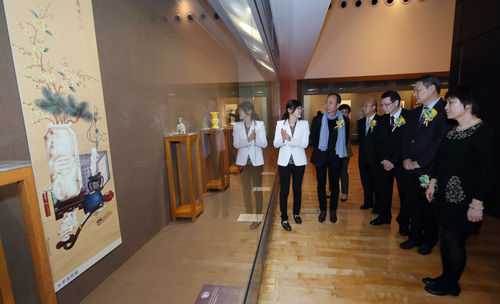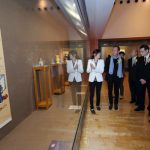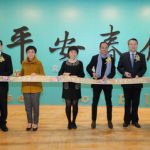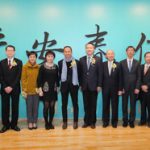 Guests visited the Exhibition
Guests visited the Exhibition
Jointly organised by the Macao Museum of Art (MAM) under the auspices of the Cultural Affairs Bureau, the Palace Museum, the Macao Foundation, the Macao Government Tourism Office and the Macao Daily News, the exhibition “Flower Vessels from the Palace Museum” marks the 18th cooperation between the Macao Museum of Arts and the Palace Museum. Over 100 sets of precious vessels from the Palace Museum closely related to life and the arts are displayed in this exhibition. In addition, authentic paintings are exhibited corresponding to the vessels. These paintings demonstrate the usage, styles and taste of various precious vessels from the Palace and the elegance of flowers in the Qing Dynasty. The exhibition was inaugurated on Friday, 16 December at 6:30pm, on the 4th floor of the Macao Museum of Art. The opening ceremony was officiated by the President of the Cultural Affairs Bureau of the Macao S.A.R. Government, Ung Vai Meng; the Representative of the Palace Museum and Deputy Editor-in-Chief of the Palace Museum Publishing House, Liu Hui; the Representative and Assistant of the Chief of the Department of Education and Culture of the Liaison Office of the Central People’s Government in the Macao S.A.R., Shao Bin; the Director of the Macao Government Tourism Office of the Macao S.A.R. Government, Maria Helena de Senna Fernandes; the Director of Macao Daily News, Lok Po; and the member of the Administrative Committee of the Macao Foundation, Au Weng Chi. The art of Chinese flower arrangement has a long history. The oldest flower vases known are from the Wei, Jin and Southern and Northern dynasties (220-589), later developing through the Song Dynasty (960-1279), Yuan Dynasty (1271-1368), Ming Dynasty (1368-1644) and Qing Dynasty (1644-1912). The use and style of Qing imperial vessels assimilate the essence of the ancient and modern. Not only do the Qing imperial vessels preserve the tradition of religious offering and retain the Chinese intellectuals’ elegant taste but they also develop their own refined characteristics. This exhibition features the history of the development of flower vessels. Visitors can appreciate all kinds of flower vessels from different perspectives while understanding the flower arrangement taste of emperors and empresses such as Emperor Qianlong and Empress Dowager Cixi. This exhibition is divided into three units with six themes, including (1) Functions: “Offering Sacrifice with Fragrant Flowers” and “Leisure Time Enjoyment” in which vessels for planting flowers used in Buddhist ceremonies and ancestors worshiping, and those used for enjoyment in libraries, boudoirs, sitting rooms and yards, among others, are displayed; (2) Styles: “Flower Arrangement and Potted Landscapes” and “Appreciation of Antiquities and Pursuit of Innovation”, in which vessels of different textures for flower arrangement and potted landscapes, and relics used in the Qing imperial palace are displayed; (3) Tastes: “The Great Emperor Qianlong” and “The Elegant Empress Dowager Cixi”, in which calligraphies and paintings by Emperor Qianlong and Empress Cixi, including poems in praise of flower vessels made by imperial order and flower vessels used in the “Da Ya Zhai” (Elegant Studio) and the “Ti He Dian” (Hall of State Harmony) are displayed. This exhibition also displays the corresponding paintings, drawings, and original display images to embody the strict production regulations of imperial vessels, in order to enhance the experience of exhibition-goers. Highlights include the “Scroll of the Life Scenes of Emperor Yongzheng’s Imperial Concubines, Standing in Front of the Mirror Wearing Elegant Clothes” in which a glazed and splendid flower pot, pot saucer and a hand-warmer are portrayed to reveal the combination of flower arrangement (planted), incense and makeup tools in the boudoir, accentuating the aesthetics of the dignified and graceful taste of imperial objects. In the form of lying cattle, the “Shiwan Kiln Moon-White-Glazed Flower Pot in the Shape of a Lying Cattle” showcases how Shiwan kilns incorporated decorative arts with the functions of the objects, by modifying the shape of human, animals, plants and others in order for them to function as practical containers. The “Qianlong Style Enamelled Square Gu Vase with Windowed Patterns of Western Figures” manifests the diversity of the embellishment of craftworks produced in the reign of Qianlong, which extraordinarily features the use of techniques and themes of Western paintings. Not only does it make the works more interesting and ravishing, but it testifies to Western influence in the East. The “Daya Zhai Style Rectangular Flower Pot with Plum Blossom and Paradise Flycatcher Motifs in Chinese Painting on Green Background”, featuring white glaze on its interior surface and bottom, and a scenic illusion painting of plum blossoms and paradise flycatchers with green background on its exterior. The Palace Museum has collected a drawing of this flower pot – a Chinese realistic colour painting. In order to allow the public to experience the exhibition from various perspectives, MAM will organize a series of activities including talks conducted by specialists from the Palace Museum, a demonstration and a workshop of literati flower arrangements, docent services, a mini Chinese music concert, games with prizes, among others. The three talks are “Flower Vessels from the Palace Museum” conducted by Han Gian, Associate Researcher of the Department of Antiquities at the Palace Museum, to be held on 17 December 2016, from 3:00pm to 5:30pm; the “Wall vases from the Qing Court and Others” conducted by Gao Xiaoran, Associate Researcher at the Palace Museum, on 14 January 2017, from 3pm to 5:30pm; and “Craft potted plants in the Qing court”, conducted by Liu Yue, Associate Researcher at the Palace Museum on 15 January 2017, from 3pm to 5:30pm. Registration can be made online or by phone during office hours. Admission is free. In the demonstration and workshop of literati flower arrangements, MAM will introduce the elegant taste and development of literati flower arrangements, enhancing their understanding of how the artistic and practical values of flower vessels coexist in real life. Docent services will be available from 3pm to 4pm on Saturdays, Sundays and public holidays from 7 January 2017. Prizes including MacBook and iPads will be awarded to the winners of the games to be launched next year. Furthermore, MAM will establish outdoor installations introducing the exhibition to the public at Barra Square, Jorge Álvares Square (Nam Van), St. Dominic's Square, Park of Dr. Carlos d'Assumpção and Tap Siac Square. For details and registration methods of the aforementioned events, please visit www.MAM.gov.mo. For enquiries, please call 8791 9814 during office hours. The exhibition “Flower Vessels from the Palace Museum” is held until 12 March 2017, on the 4th floor of MAM, located at Avenida Xian Xing Hai, NAPE, Macao. The Museum is open from 10am to 7pm (no admission after 6:30pm; closed on Mondays).
View gallery



